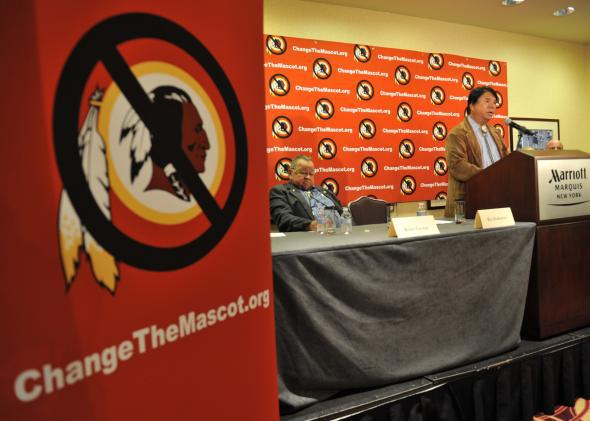The United States Patent and Trademark Office dealt quite the symbolic blow to Washington, D.C.’s professional football club today, when it canceled several trademark protections on the team’s name because it was disparaging to Native Americans.
It’s an important moral victory for the activists (and fans of basic racial sensitivity) who’ve been campaigning fruitlessly for decades, in court and out, to make the franchise change its moniker. But it might be worth tempering expectations here: Even if the decision holds up on appeal—which it might not—it’s unclear whether this ruling will actually cost the NFL or owner Dan Snyder much in the way of cash.
In theory, losing all trademark protection on Washington’s name could be financially painful. The league splits its roughly $3 billion in annual merchandise and licensing revenue evenly between 31 teams (the Dallas Cowboys opt out of the cooperative, because, you know, Jerry Jones). If companies were free to start cranking out Washington jerseys, shirts, and Snuggies without paying a fee, it might cut into those profits. That, in turn, could put pressure on Snyder to finally switch the name.
But, nice as that outcome would be, it’s not a given.
Before we get into exactly why, we need a quick rundown of today’s ruling. Under the Lanham Act of 1946, the federal government is not allowed to register trademarks that “disparage” any “persons,” “institutions,” or “beliefs.” In other words, you can’t trademark a racial slur. Today, a board ruled that Washington’s team name was, in fact, pretty odious and disparaging to Native Americans and revoked its registrations.
This is the second time the Patent and Trademark Office has reached this conclusion. Previously, a federal appeals court overturned the decision on technical grounds without ever deciding the substantive issue of whether the name was demonstrably offensive. With the technical issues apparently ironed out, this suit should finally answer that crucial question for good.
But here’s the key thing to understand: If Snyder and the NFL lose their case, they won’t actually lose their trademarks outright. They lose their federal trademark registrations, which, as Georgetown University law professor Rebecca Tushnet told me, is a crucial distinction. Without getting too into the weeds, it means that their trademark rights are basically dead in federal court. But if some guy with a T-shirt business started selling knockoff Washington football merch, the NFL could still sue him in state court under common law. At that point, whichever judge lands the case will have to decide all over again whether the name is too offensive for trademark protection. The judge might take their cues from the federal courts. But, according to Tushnet, she might not.
“We don’t really know,” Tushnet told me. “There are old cases suggesting that ought to happen. But … we don’t have much in the way of recent cases.”
New York University law professor Barton Beebe, however, disagrees with the notion that Snyder is still in a strong position. “This argument is a pathetic backstop,” he told me in an email. “It assumes that the many state courts won’t also deny protection under state law on the ground that the term is disparaging. The NFL team may win here and there at the state level, but then they have to deal with patchwork enforcement. I suspect the NFL would in fact do even worse in many states. If they’ve lost federal protection, they’ve essentially lost property rights in their mark.”
But even if Beebe’s right, the Washington football team and the NFL might not lose much. First, the USPTO canceled the trademark registrations that involved the Washington name or combinations of its name and logo. The logo itself—the plain image of its mascot—wasn’t at issue in the case. If some enterprising businessman made the mistake of slapping that profile onto a hat, the team could still probably sue. Meanwhile, individual player names are still protected. Nobody suddenly has permission to make RGIII jerseys.
So, in the worst of all possible worlds for the NFL, a few companies might be able to start producing Washington apparel without any logos or player names. Irritating? Yes. Disastrous? Probably not.
Then there’s the question of who would actually want to go into that business. As of now, the companies that want to produce pro-football-branded merchandise have to negotiate with the NFL for a collective license that covers all of the teams. (That could change, however, depending on the outcome of a pending court case.) Any corporation that decided to go rogue and start selling unlicensed Washington gear would undoubtedly incite the NFL’s wrath. That might be fine for the odd guy with a stand selling T-shirts on the corner, but not, say, Nike.
“You’re talking about bandits here,” said Scott Rosner, associate director of the Wharton Sports Business Initiative at the University of Pennsylvania. “Anybody who tries to evade is going to fall in the bad graces of the NFL, and they’re not going to get a license.”
In short, Snyder can lose this battle over trademarks, but still win this pathetic war.
